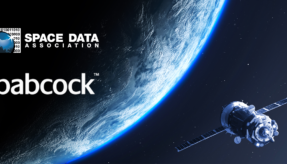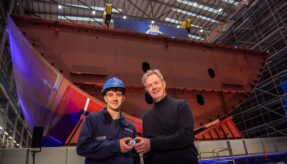
The United Kingdom is delivering clarity, collaborative partnering and leadership to a globally emerging sector. In this feature, John Baker, Head of Global Operations for the National Security and Resilience Consortium and Event Horizon space platform, examines the UK’s journey and engagement with the space sector and ambitions for the future.
It is thought that the refinement and development of paper gliders occurred in both China and Japan around 500 BCE, thus beginning humankind’s quest to create flying machines and slip the surly bonds of Earth.
We have come a long way since the novels of Jules Verne and HG Wells. The genius of current sci-fi film-making, advances in space photography, space exploration, proof of gravitational waves and the prospect of sub-orbital civilian flight have energised a new generation of students, scientists, enthusiasts and advocates of applied space science and technology. In the words of Star Trek and Star Wars director JJ Abrams: “When you work on something that combines both the spectacular and the relatable, the hyperreal and the real, it suddenly can become supernatural. The hypothetical and the theoretical can become literal.”
A quick look back through history soon reminds us that if we can think it, more often than not we can eventually do it.
NASA has landed a man on the moon, and nations have circumnavigated the Earth with crewed space craft. We utilise sophisticated satellites for intelligence gathering, scientific investigation, communications, mapping and archaeological discovery.
An International Space Station circles the Earth, and robotic vehicles have successfully landed on and continue to explore the surface of Mars. MASCOT, a shoebox-sized hopping robot asteroid lander, touched down on the 900 metres wide asteroid Ryugu this year, surviving 16 hours in the process; and we will never forget the stunning landing on Saturnian moon Titan by the Huygens lander in 2005.
As you read this feature, Voyager 1 – which launched on 5 September 1977 – is moving beyond the boundary of our solar system. It is over 13.5 billion miles from the Sun in interstellar space heading towards AC+79 3888, a star in the constellation of Camelopardalis – a journey of some 40,000 years, carrying a message from humankind.
The reality of great adventure and exploration is that new technologies are required, risks are taken and entrepreneurs steadily move to the fore, challenging existing practices. In so doing they innovate, sharing a vision which fosters new ambitions, employment and income.
The UK has a history of great adventure and innovation from Cook, Shackleton and Scott to Whittle, Berners-Lee and Peake, and today we stand at the dawn of a new age of innovation and engineering design through the application of sophisticated composite materials, advanced propulsion systems and 3D printing.
Our young pupils and students are in a similar position to that of their predecessors of the 1920s, who witnessed the rapid and evolutionary development of increasingly safe manned flight over the subsequent 80 years, resulting in trillions of pounds in revenue through manufacturing, trade, tourism and the transformational ability of humankind to move freely around the world.
In his address to the nation in 1986 following the Challenger space shuttle disaster, US President Ronald Reagan said: “We’ve grown used to wonders in this century. It’s hard to dazzle us. We’ve grown used to the idea of space, and perhaps we forget that we’ve only just begun. We’re still pioneers.”
Today we seek to move that pioneering spirit forward through the development of high-speed, sub-orbital and orbital craft for the masses, thereby progressing an increasingly affordable and therefore inexorable movement and exodus towards space and beyond.
During the 1960s and 1970s, a number of efforts were made to develop a British satellite launch capability. A British rocket named Black Arrow did succeed in placing a single British satellite, Prospero, into orbit from a launch site in Australia in 1971. However, Prospero remains the only British satellite to be put into orbit using a British vehicle.
Professor David Southwood, Chair of the UK Space Agency, commented: “The space industry in the UK is very good, often very creative and contributing to steady year-on-year economic growth. Our science capabilities are also in the front rank. However, we also do things differently than many of our partners in the European Space Agency.
“We need to look outward. We export space hardware and services globally and that must continue. The UK needs to be at the forefront of exploiting what space can bring in excitement, science and a better life here on Earth. We need to keep surprising the rest of the world with our technical capabilities. Let’s get to work!”
Although the UK is not yet sending a craft to an asteroid or to Mars, we currently:
- provide nuclear-powered systems for long-range spacecraft,
- are designing and building the next generation of satellite-carrying launch systems,
- are designing the next generation of third-world communication satellite systems,
- are 3D-printing rocket thruster systems,
- have the expertise and capability to deliver the advanced systems integration for the evolution of UK space activity,
- are delivering innovation in cleaning up the space debris which litters the low- and mid-earth orbits,
- have some of the most talented space-related SMEs in the world; and
- have passionate political and scientific advocates of space and the opportunities it holds for the UK.
Delivering results for ‘UK plc’ demands innovation in how we collaborate. It requires agile partnerships and collective engagement with a common purpose – brilliant space-related SMEs and financially strong friends cooperating within an internally non-competitive environment, with a vision to drive UK expertise across the global market. It demands brilliant and competent collective sales strategies.
The Event Horizon space platform is a well-advanced UK innovation. After five years of quiet development it has captured the very essence of the UK’s aspirations for space, in its vision and current capability.
Daniel Smith, Managing Director of Skyrora Ltd and Associate Member of Event Horizon, said: “Being a part of Event Horizon is exciting for Skyrora due to the group’s vision, collaborative strength and breadth of capability. Skyrora plans to provide swift, dedicated UK launch services to meet the growing demand for small satellite launches by combining proven technology derived from historic programmes such as Skylark and Black Arrow with modern-day innovation, in order to create cost-effective, responsive access to space. Within the Event Horizon team we are confident that we can drive the British space market forward in areas that will place us at the forefront of the sector.”
Mike Zachariah, Event Horizon lead and space consultant for Sopra Steria, is excited by what the future holds. He is driving the company forward with the intention to provide a new generation of bespoke, space-focused systems integration which is both fit for purpose and capable of operating effectively in the rapidly emerging sector.
He noted: “With the UK Government aiming to capture ten per cent of the global space market, it is the perfect time for a cost-effective launch provider and highly sophisticated systems integrator to turn UK launch plans into reality.”
British heritage… evolved!
“Once you have tasted flight, you will forever walk the Earth with your eyes turned skyward, for there you have been, and there you will always long to return” – Leonardo da Vinci, 1452-1519
If you would like to join our community and read more articles like this then please click here.







